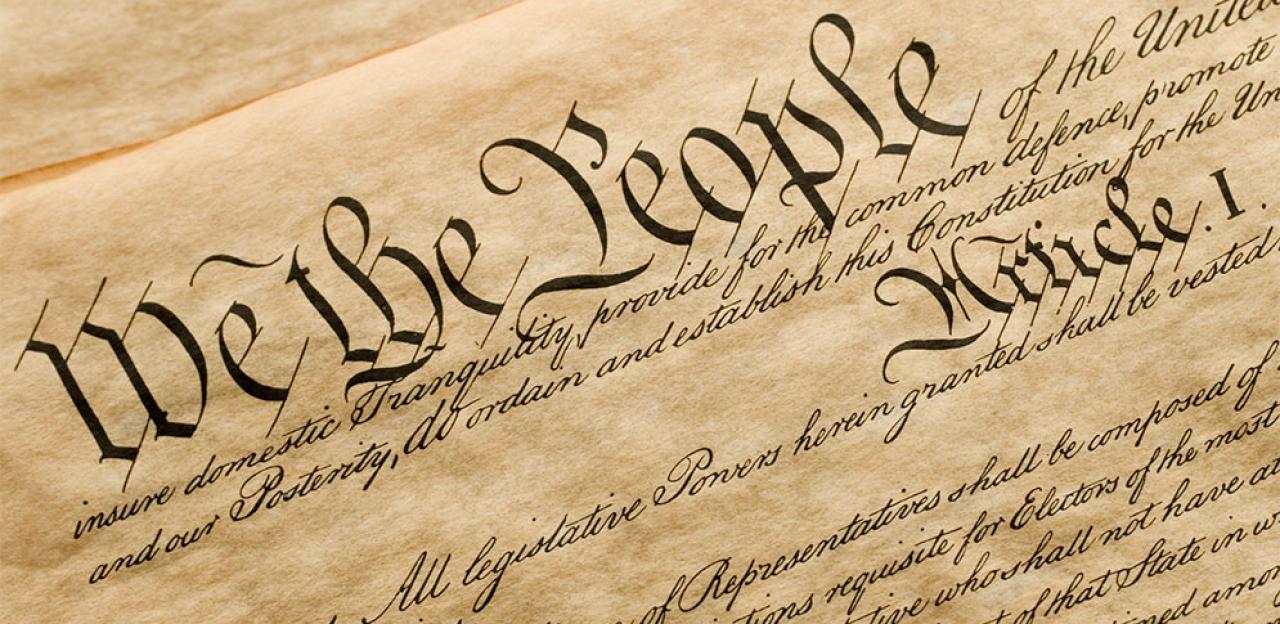Navigation
Install the app
How to install the app on iOS
Follow along with the video below to see how to install our site as a web app on your home screen.
Note: This feature may not be available in some browsers.
More options
Style variation
You are using an out of date browser. It may not display this or other websites correctly.
You should upgrade or use an alternative browser.
You should upgrade or use an alternative browser.
Team USA
- Thread starter VCheng
- Start date
F-22Raptor
Elite Member
- Jun 18, 2014
- 21,202
- 24,215
- Country of Origin

- Country of Residence

I’m here
- Thread starter
- #5
Hamartia Antidote
Elite Member
- Nov 17, 2013
- 39,570
- 22,851
- Country of Origin

- Country of Residence


‘Racist and wrong’: Mayor Wu apologizes to Boston’s Black community, men falsely linked to Stuart killing - The Boston Globe
Boston Police Commissioner Michael Cox also apologized for the department's actions following the 1989 killing of Carol Stuart, including the police manhunt that involved countless questionable stops and searches of young Black men.
Murder of Carol Stuart - Wikipedia
So I have lots of links to this case (No, i never met Charles Stuart)
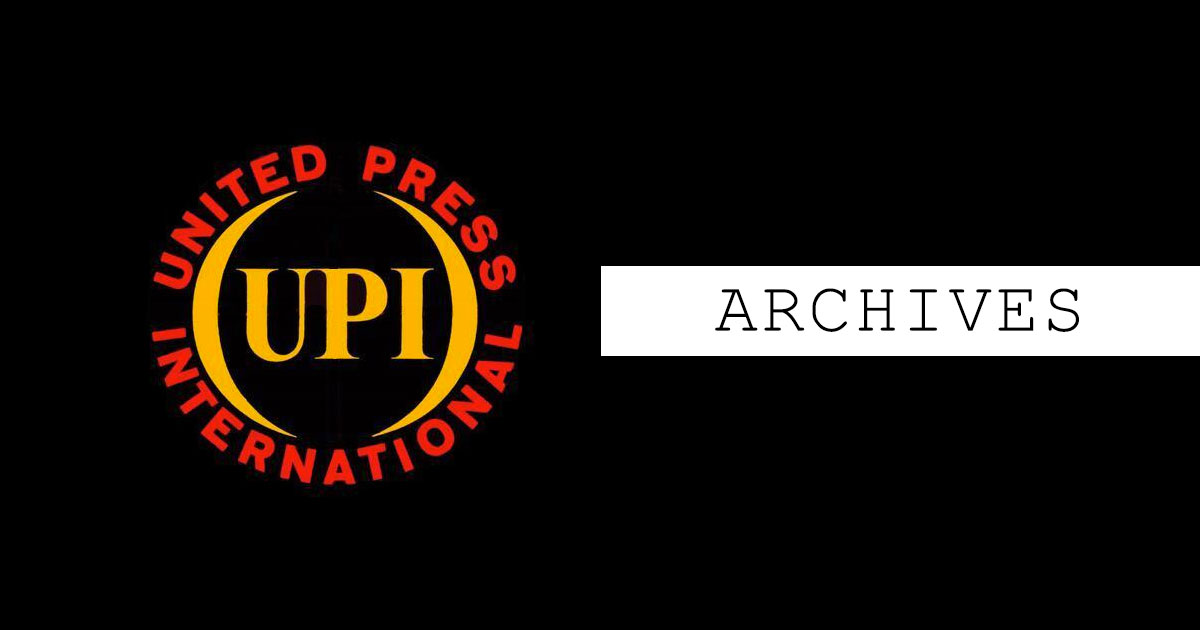
Former co-worker testifies in Stuart case - UPI Archives
A young woman co-worker reportedly told a special grand jury Friday she never had a romantic relationship with Charles Stuart, the man suspected of duping...
 www.upi.com
www.upi.com
I used to work and hang out with Debbie...the "other woman". She was way better looking than the actress above who played her.
A real stunner. However she was totally clueless that Charles had gone completely "ga-ga" over her due to her good looks.
But trust me just a glance at her by anybody and things will start falling into place very very very quickly that Charles killed his wife with the hopes of running off with her. I'm sure it didn't take long for the police detectives to put 2 and 2 together.
I knew the head of security at Kakas Furs where Charles Stuart worked. The only person I knew who always carried a gun.
The murder weapon was a gun stolen from Kakas Furs.

A friend of mines bother-in-law helped pulled Charles Stuart's body out of the water from under the bridge.
Last edited:
- Thread starter
- #7
USA is what it is because of its people. A little story, if I may:
A friend and I went out on a long riding trip to New Mexico. Stopping at a wonderful viewpoint, he noticed that there was litter, particularly used crushed water bottles. He picked up two of them and put them in his pannier. At every stop he did the same, and emptied out a whole bunch at the end of each day, even though we were on motorcycles with little space to spare. He did not clean any place up, but he contributed positively with whatever he could do, without question or complaint. That same ethic echoes throughout this society.
I learned a lot that trip, and one more reason why I love my adopted homeland and its people as much as I do.
A friend and I went out on a long riding trip to New Mexico. Stopping at a wonderful viewpoint, he noticed that there was litter, particularly used crushed water bottles. He picked up two of them and put them in his pannier. At every stop he did the same, and emptied out a whole bunch at the end of each day, even though we were on motorcycles with little space to spare. He did not clean any place up, but he contributed positively with whatever he could do, without question or complaint. That same ethic echoes throughout this society.
I learned a lot that trip, and one more reason why I love my adopted homeland and its people as much as I do.
Hamartia Antidote
Elite Member
- Nov 17, 2013
- 39,570
- 22,851
- Country of Origin

- Country of Residence

TruthSeeker
Senior Member
- Nov 26, 2008
- 6,602
- 6,190
- Country of Origin

- Country of Residence


Statistics on U.S. Generosity - Philanthropy Roundtable
In this section you’ll find charts and graphs laying out the most important numbers in American philanthropy. They document how much we give, how that has changed over time, what Read more...
 www.philanthropyroundtable.org
www.philanthropyroundtable.org

Statistics on U.S. Generosity - Philanthropy Roundtable
In this section you’ll find charts and graphs laying out the most important numbers in American philanthropy. They document how much we give, how that has changed over time, what Read more...
 www.philanthropyroundtable.org
www.philanthropyroundtable.org
Statistics on U.S. Generosity
Real Rise in U.S. Giving
After adjusting for inflation, charitable giving by Americans was close to seven times as big in 2016 as it was 62 years earlier.Of course, one reason total giving went up is because the U.S. population almost doubled. But if we recalculate inflation-adjusted charitable giving on a per capita basis, we see that has also soared: by 3½ times. Charitable causes are very lucky to have a remarkably expansive American economy behind them, and a standard of living that refuses to stagnate.
Generosity of Cities
A pattern similar to what the previous graph showed for states is also clearly visible in this data on giving levels in America’s 50 biggest cities. It is residents of our Mormon and southern Bible Belt metro areas who are our most generous citizens. Meanwhile, many of our very wealthiest urban areas—like San Francisco and Boston—rank low on generosity.
Note here the interesting divergence between Dallas and Austin. Those two cities, just 180 miles apart, share the same economic climate, exact same levels of state taxation, same basic cost of living. Where they differ rather sharply is in culture. The fact that Dallasites give almost 40 percent more to charity than Austinites underlines the powerful influence on charitable behavior exerted by factors like religious practice and political ideology.
Private Donations for Overseas Aid
Americans are much more willing than other peoples to voluntarily donate money to help the poor and stricken in foreign lands. The figures here depict private charitable giving in various forms.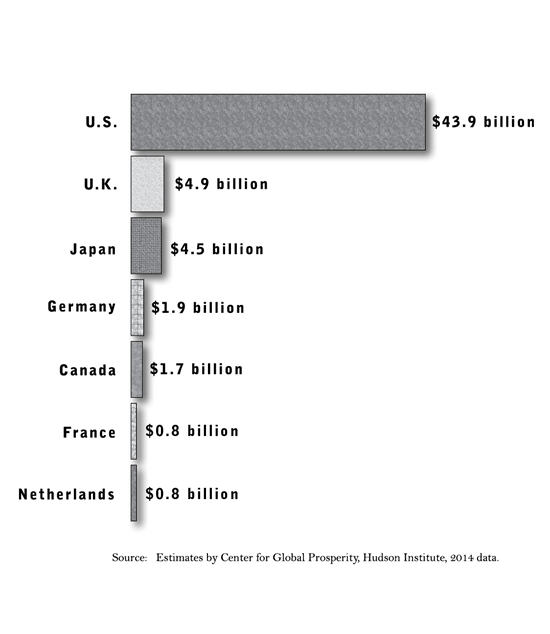
Of course there are other ways that a nation can give to less developed countries in addition to private philanthropy—official government aid, remittances to families back home by immigrants, private business investment, etc. See Graph 26 and its text for more on this subject. When you add up all of these sources of aid, the U.S. comes out far ahead of any other nation, sending $365 billion overseas annually to developing countries.
Giving Levels, by Country
A number of studies have been undertaken to compare the charitable giving of various countries in fair ways—adjusting for differences in standards of living, population, and so forth. All end up showing about the same relationship that is charted here: Americans are about twice as generous in their private giving as our kissing cousins the Canadians, and 3-15 times as charitable as the residents of other developed nations. Americans also volunteer more than almost any other wealthy people.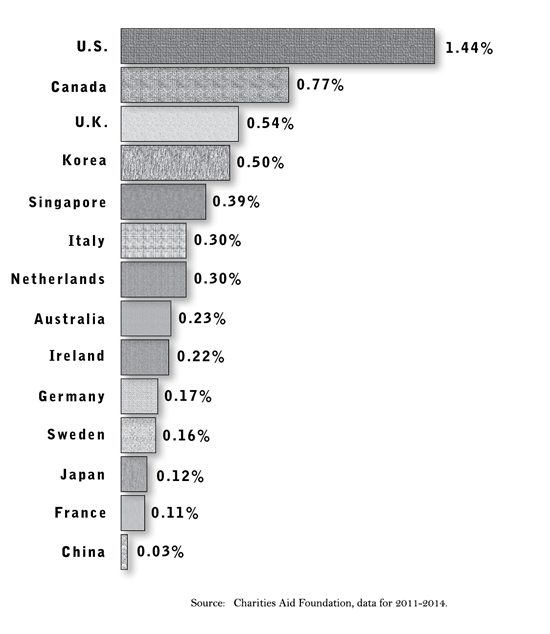
Developereo
Elite Member
- Jul 31, 2009
- 16,089
- 18,536
- Country of Origin

- Country of Residence

I love this quote by Bill. So sad to see how frail he looks now.
Beijingwalker
Elite Member
- Nov 4, 2011
- 76,985
- 104,303
- Country of Origin

- Country of Residence

America is a beautiful country, cherish my memory of the years when living there.
- Thread starter
- #12
Come on over again. The water is just fine!America is a beautiful country, cherish my memory of the years when living there.
KAL-EL
Elite Member
- Jun 2, 2013
- 7,431
- 9,866
America is a beautiful country, cherish my memory of the years when living there.
Will still be here for you to enjoy should you return one day
TruthSeeker
Senior Member
- Nov 26, 2008
- 6,602
- 6,190
- Country of Origin

- Country of Residence

The USA welcomed 967,500 new citizens in fiscal year 2022 during naturalization ceremonies held across the United States and around the world. This is a 20% increase from last year and the highest number of naturalizations seen since FY 2008.
National Archives Welcomes 25 New Citizens During Naturalization Ceremony
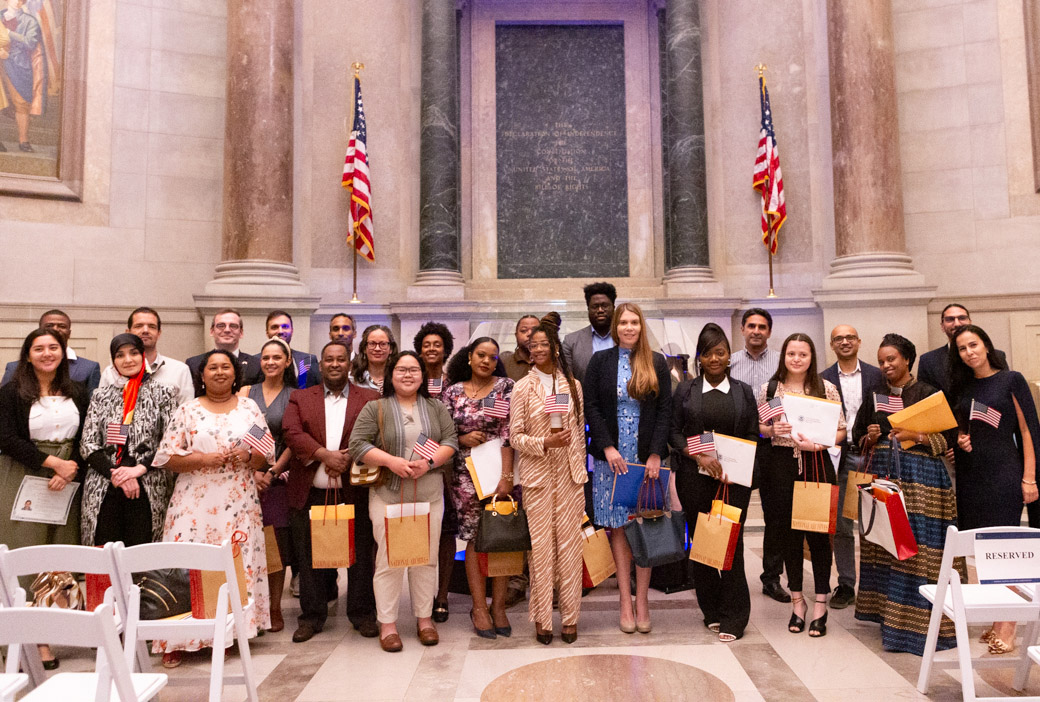
Twenty-five new citizens pose for a group portrait in the Rotunda after becoming U.S. citizens during a naturalization ceremony at the National Archives in Washington, DC, on September 15, 2023. National Archives photo by Susana Raab.
By Pete Lewis | National Archives News
WASHINGTON, September 19, 2023 — In celebration of Constitution Day, observed on September 17, 25 men and women from 24 nations took their oaths of citizenship in front of the nation’s Founding Documents (the Bill of Rights, the Constitution, and the Declaration of Independence), on September 15, in the Rotunda of the National Archives Museum in Washington, DC.
The National Archives traditionally hosts two naturalization ceremonies in the Rotunda annually, the first in September to mark Constitution Day and the second in December in honor of Bill of Rights Day.
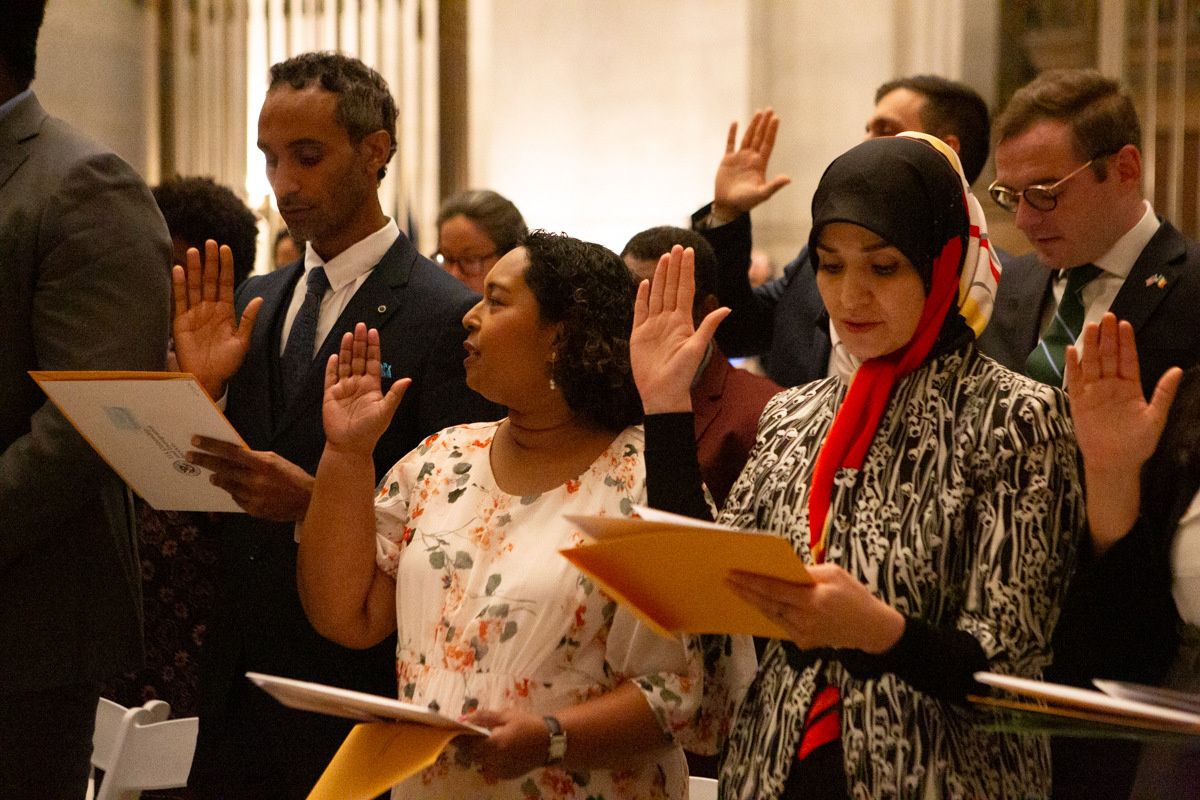
New citizens swear the Oath of Allegiance to the United States during their naturalization ceremony in the National Archives Rotunda in Washington, DC. September 15, 2023. National Archives photo by Susana Raab.
The ceremony was hosted by Dr. Colleen Shogan, 11th Archivist of the United States. The Honorable James E. Boasberg, Chief Judge of the United States District Court for the District of Columbia, presided as the petitioners for United States citizenship took the oath of citizenship. Students from Alice Deal Middle School in Washington, DC, recited the Preamble of the Constitution.
Shogan spoke to the new citizens of the importance of the Founding Documents and the rights they upheld for all U.S. citizens.
“These Charters are the bedrock of our democracy; but they are not static relics,” she said. “They are a testament to the enduring values of freedom, justice, and equality that we are continuously striving to perfect. They are living promises—a covenant between the government and its citizenry.”
As the new Americans listened on, Shogan further offered hospitable words.
“As the Archivist of the United States, it is my distinct honor to be the first to officially welcome you as the newest members of our big boisterous American family!” she said.
The 25 new citizens are originally from 24 nations: Afghanistan, Bangladesh, Belarus, Cameroon, Canada, Colombia, Dominican Republic, Egypt, El Salvador, Eritrea, Ethiopia, Germany, Ghana, Guyana, Hungary, India, Ireland, Jamaica, Mexico, Philippines, Portugal, Senegal, Serbia, and Venezuela.
Alex Marki, a researcher from Hungary, said he wanted to become a U.S. citizen in order to help people through his work.
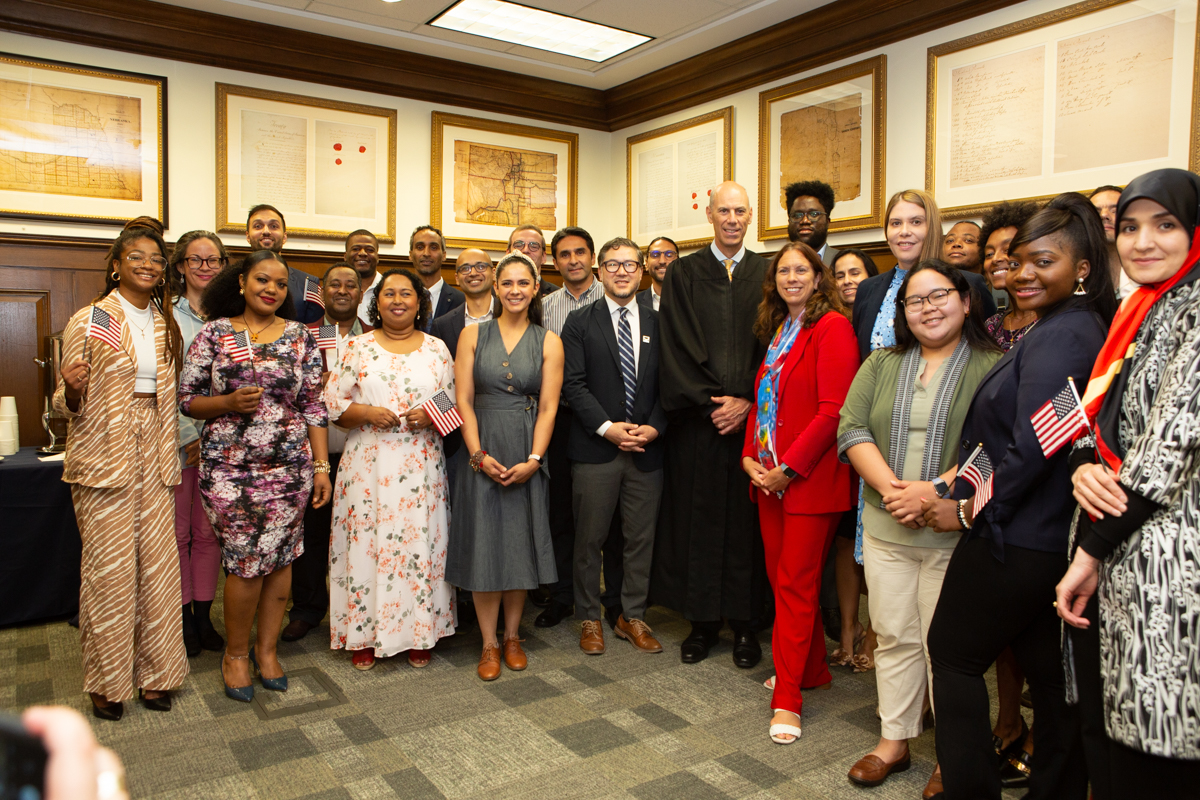
At center, keynote speaker Reverend Eugene Cho, the Honorable James E. Boasberg, and Archivist of the United States Dr. Colleen Shogan pose with new citizens after the naturalization ceremony held in the National Archives Rotunda in Washington, DC. September 15, 2023. National Archives photo by Susana Raab.
“America, I believe, is the best place in the world for research today. I'm really impressed by how many good things come out from this country; inventions, medicines, technologies,” Marki said. “I really want to contribute to this … so I decided to stay here and be part of this country and contribute to my best."
Aram Earsa, an Iranian who emigrated to Canada before seeking citizenship in the U.S., said he is happy to be part of "an amazing country, with a unique history."
"I'm very happy to finally complete my journey today and become a United States citizen,” Earsa said. “This country has always contributed to progress over the years, and I would be happy to be part of the future improvement and future progress of this country."
This year’s Constitution Day marks the 236th anniversary of the ratification of the U.S. Constitution. Learn more online about the U.S. Constitution through our public programs, family activities, and online resources.
This program was presented thanks to a long-standing partnership between the U.S. District Court for the District of Columbia and the Department of Homeland Security U.S. Citizenship and Immigration Services.
Art Eralith
Member
- Dec 22, 2023
- 87
- 72
- Country of Origin

- Country of Residence

Their constitution.
Users who are viewing this thread
Total: 2 (members: 0, guests: 2)
Pakistan Defence Latest
-
-
-
-
Azerbaijan Air Force Becomes Fourth Operator of JF-17 Fighter Aircraft, President Aliyev Confirms (3 Viewers)
- Latest: FOOLS_NIGHTMARE
-
Country Watch Latest
Latest Posts
-
Hezbollah-Israel Conflict 2024 - Lebanon & Occupied Palestine Territories (72 Viewers)
- Latest: Falcon29
-
-
-



